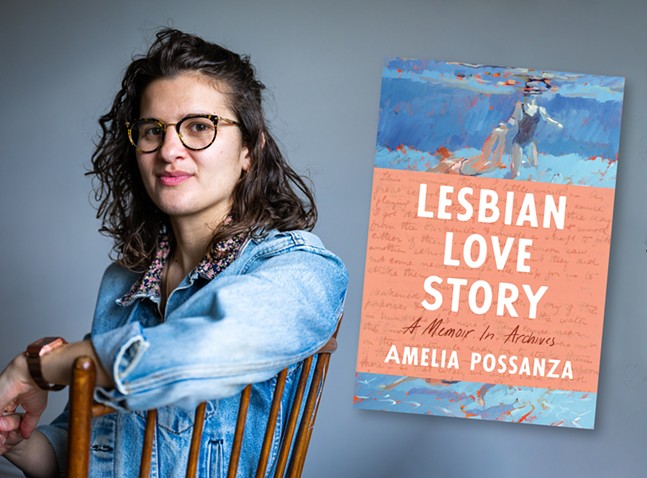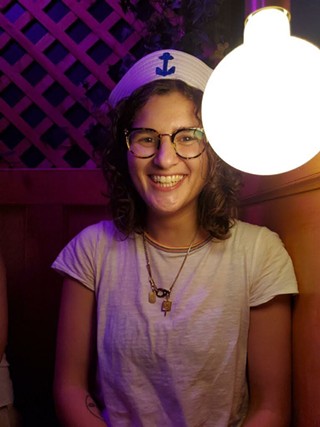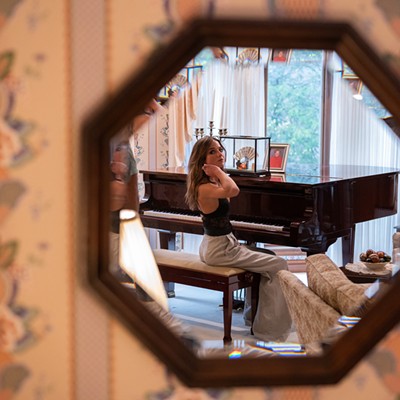Amelia Possanza thought she was writing about a “niche topic.” Her first book, Lesbian Love Story: A Memoir in Archives, published in May by Catapult, is a collection of stories about women whose lives, professionally and certainly personally, went unnoticed because of their sexual orientation.
But since the book’s publication, the Squirrel Hill native has garnered press from NBC, NPR, Interview Magazine, and other mainstream outlets. Readers she didn’t expect have embraced the stories Possanza features in the book.
“I have been surprised by the response it’s getting,” Possanza tells Pittsburgh City Paper. “People, in this hilarious way, have felt the need to sort of announce their sexuality to me when they talk about the book. A lot of people say, ‘I’m not a lesbian but I really enjoyed your book, I really related to your book,’ and that’s’ been kind of incredible, too, because I started the project very much for myself. I wanted to find the stories that had been missing from my upbringing.”
She adds, “The idea that what started out as a personal project would resonate with people — and people who aren’t even lesbians — is pretty exciting to me.”
Possanza, who attended Winchester Thurston School and works full-time as an associate director of publicity for Macmillan, dug into library and internet archives to unearth the stories of lesbian couples. Some are more familiar, such as Babe Didrikson Zaharias, who won two gold medals in track and field at the 1932 Summer Olympics, competed in men’s golf tournaments, and was a founding member of the Ladies Professional Golf Association.
But the majority of chapters feature women such as Mary Casal, whose 1930 autobiography, The Stone Wall, was edited by two men studying sexuality, or Mabel Hampton, a Black woman who fought for civil and gay rights, and was grand marshal of New York City’s Pride March in 1985. Possanza also interviewed Joan Nestle, a founder of the Lesbian Herstory Archives.
While her day job gives Possanza proximity to an array of writers, the subjects of Lesbian Love Story influenced her storytelling the most.
“I was deeply affected by the writing styles of the different lesbians that I studied, and I ended up using so much of their own words, whether it was oral history tapes or memoir,” Possanza says. “In the book, I wanted readers to read their words — I didn't want to be just speaking for them.”
She expands on this, adding, “And I do think that that rubbed off on me, too, their way of looking at life, their sense of humor. So maybe my day job prepared me to be more of a sponge than I realized, and I absorbed those different styles, characteristics, types of jokes, and was able to sort-of slide into those different characters for each different chapter.”
As a student, Possanza says she wasn’t into history, partly because those who are featured in textbooks were generals or politicians. “I think history really favors big, decisive moments,” she says.
And even queer history, Possanza notes, is often focused on events such as the Stonewall riots of 1969, “another battle story.” When people asked why certain individuals were included in the book, Possanza initially talked about their jobs; Mabel Hampton, for instance, was an air raid warden during World War II, a dancer, and one of the founders, along with Nestle, of the Lesbian Herstory Archives in Brooklyn.
“But what I began to realize,” Possanza says, “that what makes [Hampton] inspiring to me is she offers up a blueprint for us: Practice resistance in your everyday life, practice community caretaking. … And I think the impact it had on my life was being more community-minded, being more invested in the day-to-day. We live in such an individualistic obsessed culture, and I do think that the inspiration this collection of lesbians gave me was what do I want my day-to-day life to look like, who do I want to be in it, and how can I make sure that every day I’m resisting some of the dominant structures in our society.”
Lesbian Love Story: A Memoir in Archives by Amelia Possanza. books.catapult.co















